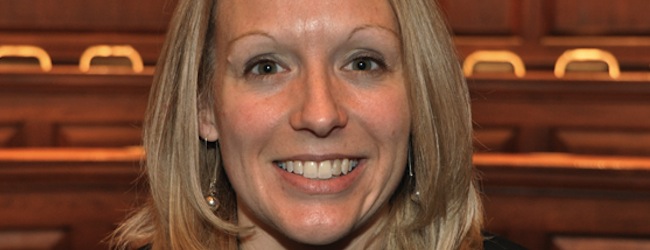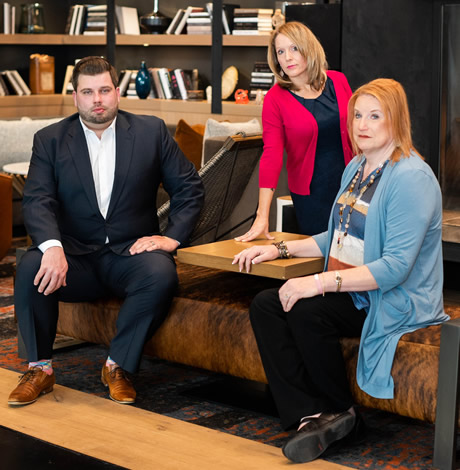Living
Equality Md. leader fired
Development director quits in protest; Meneses-Sheets cites ‘destructive forces’

The board of directors of the statewide LGBT organization Equality Maryland voted Sunday night in a closed meeting to fire its executive director, Morgan Meneses-Sheets, according to a statement released today by Matthew Thorn, the group’s development director.
Thorn, who was hired in January to lead Equality Maryland’s fundraising activities, announced in his statement that he was resigning immediately in protest over the board’s decision to dismiss Meneses-Sheets.
“This past Sunday, the Board of Directors of Equality Maryland, in executive session, voted to remove her from her position, essentially telling the organization’s staff, volunteers, supporters, funders and general community that the organization will now move in a different direction,” Thorn said in his statement.
“I fear that the direction that the board seeks to take is one that will not be a beneficial path for the community, for the organization, for the staff and especially for the organization’s funders, and that’s why, effective today, I am resigning from my position as director of development of Equality Maryland.”
In her own statement sent to the group’s volunteers today, which sources said she planned to post on her personal Facebook page, Meneses-Sheets said, “It is with heavy heart that I share that today will be my last day as the executive director of Equality Maryland. While it is not my choice to leave, it is my choice to make my voice heard as I exit.”
While her tenure at the organization over the past 18 months has provided “some of the most rewarding moments of my career,” she said in her statement that her job has also been “extremely” difficult.
“In particular the past few months have been tough to bear,” she said. “Not because of the hard work which I welcome and felt honored to be part of, but because of the forces within the organization and external politics that created additional and unnecessary obstacles to our forward movement and success.”
She added, “As I move on, I will not focus on the negative or destructive forces that created this untenable situation; instead I will look back at the many proud moments along the way.”
Patrick Wojahn, chair of the board of the Equality Maryland Foundation, the group’s educational arm, said the board would not comment on specific reasons for Meneses-Sheets’ departure, other than to say “it was a mutual decision by her and the organization.”
He said the board views both Meneses-Sheets’ and Mathew Thorn’s departures as personnel matters, which the board doesn’t publicly discuss.
Asked about Meneses-Sheets’ statement saying it was not her choice to leave the organization, Wojahn said, “It was partially our decision, too. But we essentially decided to go in a different direction as an organization. And I don’t want to comment any more on personnel matters.”
He added, “We should be coming out next week with more information on how we intend to proceed.”
Meneses-Sheets did not return a call Friday seeking an interview to discuss why she believes the board chose to dismiss her.
Sources familiar with the organization, who spoke only on condition that they not be identified, said Meneses-Sheets’ firing could stem, in part, from disagreements between her and board members over some of her decisions in carrying out the group’s efforts to pass a same-sex marriage bill and transgender non-discrimination bill in the Maryland Legislature.
At least two sources said board members became irate when she disclosed in a telephone news conference with media representatives the group’s timetable for seeking a vote by lawmakers on the marriage bill. The board members reportedly believed releasing such information would help opponents of the bills develop strategies to block or kill the legislation.
Her discussion on the media call about the strategy for the bill’s timing prompted Equality Maryland Board Chair Charles Butler to issue an order prohibiting Meneses-Sheets from speaking to the media, an action that other staff members viewed as an unfair intrusion by the board into her ability to use her judgment in carrying out the board’s policies, one of the sources said.
The same source said some board members became further upset last month when Meneses-Sheets agreed to a question-and-answer interview in Metro Weekly magazine, in which her photo appeared on the magazine’s cover.
“Some of them thought she was thumbing her nose at those on the board who didn’t want her to talk to the press,” the source said.
Her supporters viewed the board’s directive prohibiting an executive director of a political organization from talking to the media as a petty intrusion into the day-to-day operation of the group, sources familiar with the group said.
One source blamed the board for “failing to get their own act together” on the marriage and transgender bills.
Butler didn’t return a call on Friday seeking his views on the reasons for Meneses-Sheets’ dismissal.
The departure of Meneses-Sheets and Thorn from Equality Maryland follows a tumultuous four-month period in which tense, behind-the-scenes disputes surfaced between board members and Meneses-Sheets over strategy in the group’s unsuccessful effort to pass same-sex marriage and transgender non-discrimination bills, according to sources familiar with the organization.
Sources say the tension and sometimes bitter infighting went beyond Equality Maryland and involved a tangle of alliances with several national LGBT organizations that exerted great influence over the push to pass the same-sex marriage bill. Among them were D.C.-based Human Rights Campaign, Denver-based Gill Action Fund and the New York-based Freedom to Marry.
E-mails obtained by the Blade that were sent by officials of the three groups to Meneses-Sheets, Equality Maryland board members and LGBT members of the Maryland Legislature show that the groups pushed hard for cancelling a planned vote on the marriage bill in the state’s House of Delegates. The controversial decision to cancel the vote and recommit the bill to committee, which killed it for the year, came after the national LGBT groups and some supportive lawmakers determined they didn’t have the votes to pass the bill and it would be better to recall it then go forward with a losing vote.
Other activists and Equality Maryland supporters strongly disputed that decision, saying the bill had a chance of passing and even if it lost, it would have been better to force lawmakers to take a recorded vote to determine where they stood on marriage equality.
The death of the marriage bill for the legislature’s 2011 session was quickly followed by a separate vote in the Maryland Senate to recommit to committee the Gender Identity Non-Discrimination Act, an action that also killed that measure for the year.
The two developments were viewed as a double defeat for Equality Maryland at a time when many thought the legislature should have passed both measures. Supporters of Meneses-Sheets say at least some Equality Maryland board members were seeking to make her the “scapegoat” for the bills’ defeat, saying the demise of the two measures was due, at least in part, to forces beyond Equality Maryland’s control
Meneses-Sheets devotes most of her two-page statement to citing what she calls the major successes of Equality Maryland during her tenure and the tenure of the group’s staff and volunteers. Among other things, she said the group played a key role in the advancement of the same-sex marriage and transgender rights bills to a point further than had been achieved over the previous five years.
“As a Marylander, as a lesbian, as a parent, as someone with many loved ones who are transgender and as someone who believes in social justice, I sincerely hope that Equality Maryland will succeed in their future endeavors to ensure that our state lives up to the promise of equality for all of its citizens,” she said. “This will require significant change, but it is possible.”
Meneses-Sheets became the third executive director of Equality Maryland to leave the group since 2008. Thorn’s resignation comes just five months after he joined the group in January. His predecessor as development director, Kevin Walling, left the group in September 2010 less than two years after being hired in January 2009.
Thorn’s statement in full:
“Today, it is with great sadness that I resign as director of development of Equality Maryland. Over the past few months, I have given tireless energy to see the success of the organization and it has been made apparent in these last few days that the organization, lead by the board of directors wishes to see the organization to move in a different direction.
Gay, lesbian, bisexual and transgender Marylanders have found a true champion in Morgan Meneses-Sheets. Not only has she committed time and energy away from her wife and her 5-month-old daughter, but she had the tenacity to keep fighting in Annapolis, even when all others had given up. Giving up just isn’t in her vocabulary. This past Sunday, the board of directors of Equality Maryland, in executive session voted to remove her from her position, essentially telling the organization’s staff, volunteers, supporters, funders and general community that the organization will now move in a different direction.
I fear that the direction that the board seeks to take is one that will not be a beneficial path for the community, for the organization, for the staff and especially the organization’s funders, and that is why, effective today, I am resigning from my position as director of development of Equality Maryland. I wish nothing but the best to the staff and the community and hope that we can overcome these obstacles to continue to fight for our full equality.”

As the days grow longer and buyers re-emerge from winter hibernation, the spring market consistently proves to be one of the strongest times of year to sell a home. Increased inventory, motivated buyers, and picture-perfect curb appeal make it a prime window for homeowners ready to list.
The good news? Preparing your home for spring doesn’t require a full renovation or a contractor on speed dial. A few thoughtful, cost-effective updates can dramatically elevate your home’s appeal and market value.
Here are smart, inexpensive ways to get your property market-ready:
Fresh Paint: The Highest Return on a Small Investment
Few improvements transform a home as quickly and affordably as paint. Neutral tones remain the gold standard, but today’s buyers are gravitating toward warmer tan hues that create an inviting, elevated feel without overwhelming a space. Soft sandy beiges and warm greige-leaning tans provide a clean backdrop that photographs beautifully and allows buyers to envision their own furnishings in the home.
Freshly painted walls signal care and maintenance — two qualities buyers subconsciously look for when touring properties.
Removable Wallpaper: Style Without Commitment
For homeowners wanting to introduce personality without permanence, removable wallpaper offers a stylish solution. A subtle textured pattern in a powder room, a soft botanical print in a bedroom, or a modern geometric accent wall can add depth and character. Because it’s easily removed, it appeals to both sellers and buyers — creating visual interest without long-term risk.
Upgrade Light Fixtures for Instant Modernization
Outdated lighting can age a home instantly. Swapping builder-grade fixtures for modern, streamlined options is one of the simplest ways to refresh a space. Consider warm metallic finishes or matte black accents to create a cohesive, updated look. Proper lighting not only enhances aesthetics but also ensures your home feels bright and welcoming during showings.
Elevate Curb Appeal: First Impressions Matter Most
Spring buyers often decide how they feel about a home before they ever step inside. Refreshing curb appeal doesn’t require major landscaping. Simple updates such as fresh mulch, trimmed shrubs, seasonal flowers, a newly painted front door, and updated house numbers can dramatically improve first impressions. Power washing the driveway and walkways also delivers a clean, well-maintained appearance for minimal cost. Even if you don’t have a curb to appeal- think potted plants on your patio, balcony and change out your door mat.
Deep Clean & Declutter (Seriously, It Matters)
A deep, top-to-bottom cleaning is basically free and one of the most impactful things you can do. Scrub floors, windows, grout, baseboards, appliances, bathrooms, and everything in between. Don’t forget to clean windows inside and out — natural light is a huge selling point. Declutter by packing up excess stuff, clearing off countertops, and minimizing personal items so buyers can see the space, not your life.
Let the Light Shine
Make your home feel bright and inviting by cleaning windows, opening blinds, and replacing dark or dated light fixtures with contemporary, budget-friendly options. Swapping in LED bulbs offers brighter light and lower utility costs — a small change that buyers appreciate. Pro tip: I always recommend removing widow screens to allow as much light in as possible
Neutralize Scents
Make sure the home smells fresh. Neutralizing odors — whether from pets, cooking, or moisture — creates a clean, welcoming atmosphere. Light natural scents like citrus or subtle florals can be inviting during showings. Think of how your favorite hotel smells and go for that.
Spring market rewards preparation. By focusing on high-impact, low-cost improvements, sellers can position their homes to stand out in a competitive environment. With thoughtful updates and strategic presentation, homeowners can maximize both buyer interest and potential sale price — all without overextending their renovation budget.
As activity increases and inventory begins to rise, now is the time to prepare. A little polish today can translate into significant results tomorrow.
Justin Noble is a Real Estate professional with Sotheby’s International Realty Servicing Washington D.C., Maryland, and the beaches of Delaware.
Advice
Dry January has isolated me from my friends
Is it possible to have social life without alcohol?

Dear Michael,
Some of my friends and I decided to do Dry January.
The six of us are a posse, we’ve been friends for years. Many boyfriends and even a husband or two have come and gone but we get together all the time and travel together.
I think we all agreed that drinking is too big a part of our social lives and thought we’d give Dry January a shot.
So … I am feeling better and it’s only been three weeks.
I’ve actually lost a little weight, and it’s nice not to wake up with a hangover four mornings a week. I’m pushing 40 and no surprise, my body feels relieved.
But, I’m also the only one of us who is still doing it.
Which means they are all going out and I am not. So I am feeling lonely.
I could join them in going out but first of all, I don’t really want to hang out with them when they’re drunk and I’m trying to be alcohol free; and also, there’s a part of me that is afraid I will give in to temptation and have a drink. And then it will be back to business as usual.
But, I spent this past weekend, and every night this week, alone.
All of this has me thinking: what do I do in February? I really don’t want to start drinking again.
But, if I don’t, how do I stay part of my friend group? If they’re buzzed (or drunk) and I’m not, am I still going to fit in?
I’m disappointed in my friends. We were all in this together, I thought, but one thing after another came up for them.
Some special event where “everyone was drinking,” a work dinner where “I didn’t want to deal with everyone’s questions about why I wasn’t drinking,” “too much work stress not to have a martini,” etc. In the end they were all laughing about it and now they’re basically poking fun at me and essentially betting how long I will last. That doesn’t feel good. It’s like the whole thing was a whim or a joke to them.
Also, heavy alcohol use is pretty typical of our community. If I’m not drinking then how do I have a social life?
Appreciate your thoughts.
Michael replies:
It can be hard to be different. For example, to be gay in a straight world, or not to drink in a world where alcohol plays such a big part.
I’m a believer in living in a way that respects whom you actually are. This means doing what you think is important to do, even when there are consequences you don’t like. Only you can decide the boundary where the consequences of your living with integrity become intolerable.
Yes, many gay men drink a lot. So if you decide you don’t want to hang out where alcohol is involved, you will be reducing your options for socializing.
Some possibilities:
- Discuss this situation with your friends. Ask them if they’re willing to spend some time with you and without alcohol. (Not all the time — that would be way too much to ask, given that they clearly enjoy drinking.) Perhaps if you explain why your request is important to you, they’ll be willing to lean in your direction at least some of the time. That they’re now mocking you for not drinking suggests I am a bit too optimistic about this possibility. But who knows? And, what have you to lose by asking?
- See if you can tolerate hanging out with people who are drinking without picking up a drink yourself, and if you can actually enjoy such interactions.
- Start looking for some new friends. There are, in fact, lots of gay men in this world whose social lives don’t revolve around alcohol (or other substances.)
On a separate but related note: given your fear that you will start drinking again, and your concerns about navigating life without alcohol, might you consider Alcoholics Anonymous to get some support?
I’ve seen AA and other 12-step groups help many friends and clients, and I think they work in two main ways.
First, attending meetings gives you support and a feeling of community. You’ll meet others who are working to be sober, hear their stories and share your own struggles with them. You’re likely to feel less alone in your effort to stop drinking, learn tools for staying sober, and make friends you can reach out to when you’re feeling vulnerable. You’ll also have a sponsor, your guide and advocate in the program, whom you talk with regularly.
Second, the program lays out “12 steps” of recovery that are a path to greater self-awareness and personal growth. Like good psychotherapy, the steps give you a framework for looking at your behavior patterns and taking responsibility for yourself.
If you are intrigued, the best way to learn more is to attend several 12-step meetings. There are many in our area, including gay groups (for example, the Triangle Club.) As I mentioned, if you do get involved in AA, a side benefit is that you’re likely to make some new friends who share your desire to build a life without alcohol.
Of course, making new friends does not have to mean cutting off your posse. But if you’re changing in ways that make them less of a great fit, it would be great to find some new folks who might be more on your wavelength to connect with.
Michael Radkowsky, Psy.D. is a licensed psychologist who works with couples and individuals in D.C., Maryland, Virginia, and New York. He can be found online at michaelradkowsky.com. All identifying information has been changed for reasons of confidentiality. Have a question? Send it to [email protected]
Real Estate
2026: prices, pace, and winter weather
Lingering snow cover, sub-freezing temperatures have impacted area housing market

The D.C. metropolitan area’s housing market remains both pricey and complex. Buyers and sellers are navigating not only high costs and shifting buyer preferences, but also seasonal weather conditions that influence construction, inventory, showings, and marketing time.
Seasonality has long affected the housing market across the U.S. Activity typically peaks in spring and summer and dips in winter; however, January and February 2026 brought unusually cold spells to our area, with extended freezing conditions.
Persistent snow and ice-covered roads and sidewalks have gone for days, and in some cases weeks, before melting. While snow accumulation normally averages only a few inches this time of year, this winter saw below-normal temperatures and lingering snow cover that has significantly disrupted normal activity.
Rather than relying on neighborhood teenagers to shovel snow to make some extra money, the “snowcrete” has required ice picks, Bobcats, and snow removal professionals to clear streets and alleys, free our cars from their parking spaces, and restore availability of mass transit.
These winter conditions have had an adverse impact on the regional housing market in several ways.
- Construction slowdown: New builds and exterior improvements often pause during extended cold, resulting in delayed housing starts when we need affordable housing in the worst way.
- Listing preparation: Cleaning crews, sign installers, photographers, and stagers with trucks full of furniture may be unable to navigate roads and need to postpone service.
- Showings and open houses: Simply put, buyers are less inclined to schedule visits in hazardous conditions. Sellers must ensure walkways and parking areas are clear and de-iced and be able to vacate the property while viewings are taking place.
- Inspection and appraisal delays: Like buyers and sellers, ancillary professionals may be delayed by unfavorable weather, slowing timelines from contract to close.
- Maintenance and repairs: Properties with winter damage (e.g., ice dams or frozen pipes) may experience repair delays due to contractor availability and supply chain schedules. Snow and cold can also affect properties with older and more delicate systems adversely, leading some sellers to delay listing until better conditions arrive.
- Availability of labor: Increasingly, construction, landscaping, and domestic workers are reluctant to come into the District, not because of ice, but because of ICE.
Overall, the District has shown a notable increase in days on the market compared with past years. Homes that once sold in a week or less are now often listed for 30+ days before obtaining an offer, especially in the condominium and mid-range house segments. While part of this shift can be attributed to weather and climate, interest rates, uncertain employment, temporary furloughs, and general economic conditions play key roles.
Nonetheless, we continue to host some of the region’s most expensive residences. Historic estates, including a Georgetown mansion that sold for around $28 million, anchor the luxury segment and reflect ongoing demand for premium urban property.
But even in this high-end housing sector, marketing strategies are evolving based on seasonal realities. Price reductions on unique or niche properties, such as undersized or unconventional homes, reflect a broader market adjustment where competitive pricing can shorten selling time.
For example, a beautifully renovated, 4-story brick home with garage parking and multiple decks that overlook the Georgetown waterfront sold in early February for 90 percent of the list price after 50 days on the market.
At the other end of the spectrum, a 2-bedroom investor-special rowhouse in Anacostia only took eight days to sell for under $200,000, down 14 percent from its original list price. In addition, four D.C. homes took more than 250 days to sell, including an 8-bedroom rooming house that was on the market for 688 days and closed after a 23 percent downward price adjustment.
Some frustrated sellers are simply taking their homes off the market rather than dropping prices below their mortgage balances, although we are beginning to see the resurgence of short sales for those who must sell.
Condominiums and cooperatives offer many opportunities for buyers and investors, with 1,100 of them currently on the market in D.C. alone. List prices run the gamut from $55,000 for a studio along the Southwest Waterfront to nearly $5 million for five bedrooms, four full baths, and 4,400 square feet at the Watergate.
So, while Washington metro area prices remain high, the pace of sales now reflects both seasonal and economic realities. Homes taking longer to sell, in part caused by elements of winter, signal a shifting market where buyers can take more time to decide which home to choose and have a better negotiating posture than in recent years.
Accordingly, sellers must continue to price strategically, primp and polish their homes, and prepare for additional adverse circumstances by reviewing fluctuating market conditions with their REALTOR® of choice.
Valerie M. Blake is a licensed Associate Broker in DC, MD & VA with RLAH @properties. Call or text her at (202) 246-8602, email her at [email protected] or follow her on Facebook at TheRealst8ofAffairs.


















